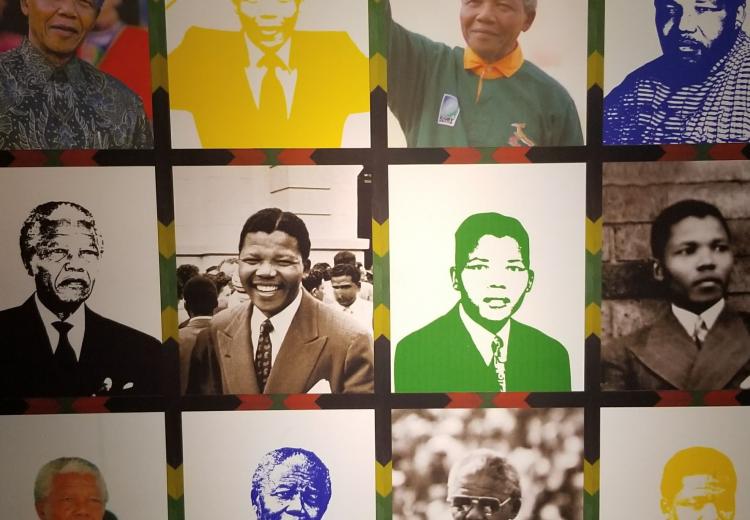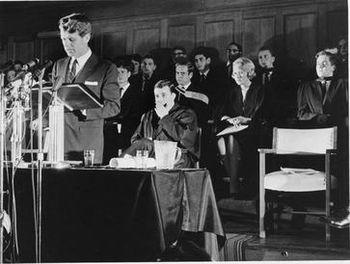Films
A History of the South African Film Industry—A chronology of film and movie technology in South Africa dating back to 1895.
Cry, Freedom (1987)—Starring Denzel Washington and Kevin Kline, this film tells the story of Steve Biko and the student movement in South Africa during the 1960s and 70s.
A Dry White Season (1989)—Marlon Brando, Donald Sutherland, and Susan Sarandon star in this film based on André Brink's 1979 novel by the same title.
Cry, the Beloved Country (1995)—Based on Alan Paton's 1948 novel, this film stars James Earl Jones and Richard Harris as two fathers on opposite sides of a murder.
Invictus (2009)—Based on events surrounding the 1995 Rugby World Cup in South Africa, the film stars Matt Damon and Morgan Freeman.
District 9 (2009)—How do we treat people different than us? What are those differences based on? This sci-fi film explores segregation, discrimination, and apartheid-like actions, but with aliens.
Long Walk to Freedom (2013)—Based on the autobiography by the same title, this biopic stars Idris Elba as Nelson Mandela.
Winnie Mandela (2013)—Jennifer Hudson plays the titular character who emerged as a leader in her own right when her husband was imprisoned and her country was fighting for freedom.
Miracle Rising (2013)—Review discussion questions and primary source recommendations with this class guide provided by the History Channel.
Becoming Nelson Mandela—Included in the NEH supported Radio Diaries project, this resource focuses on Mandela's biography, with particular attention to the Rivonia Trial.
Music
Hugh Masekela “Mandela (Bring Him Back Home)” (Video)—South African musician and anti-apartheid activist, Masekela's song about freeing Mandela became an anthem upon its release in 1987.
U2 “Silver and Gold” (Video)—The Irish rock band that often takes on global politics released this anti-apartheid song in 1985.
"Boputhuswana is far away
But we know it's in South Africa no matter what they say
You can't buy me I don't care what you pay
Don't ask me Sun City because I ain't gonna play."
— "Ain't Gonna Play Sun City" (1985)
Artists United Against Apartheid “Sun City” (Video)—Sun City was a luxury resort in South Africa that became the target of musicians who wanted to support the cultural boycott that the United Nations imposed on South Africa in the 1980s. Little Steven van Zandt of E Street Band fame organized 49 musicians as the group "Artists United Against Apartheid" to record an album of anti-apartheid songs in 1985.
The Specials “Free Nelson Mandela” (Video)—Released in 1984, this song was played at sporting events, political rallies, and at charity concerts around the world as opposition to apartheid became a global movement.
Soweto Gospel Choir “Freedom” (Video)—This Xhosa and English language album was recorded by the world renowned and award winning gospel choir from the hometown of Nelson Mandela, Archbishop Desmond Tutu, Winnie Mandela, and many more leaders of the anti-apartheid movement.
Literature
“I see only one hope for our country, and that is when white men and black men, desiring neither power nor money, but desiring only the good for their country, come together to work for it.”
—Alan Paton, Cry, the Beloved Country
- Bibliography of South African literature—A collection of critically acclaimed literature produced in and about South Africa.
- The Story of an African Farm, Olive Schreiner (1883)
- Native Life in South Africa, Sol Plaatjie (1916)
- Cry, the Beloved Country, Alan Paton (1948)
- When Rain Clouds Gather, Bessie Head (1968)
- A Dry, White Season, Andre Brink (1979)
- July’s People, Nadine Gordimer (1981)
- Kafka's Curse, Achmat Dangor (1997)
- The Heart of Redness, Zakes Mda (2000)
- Country of My Skull, Antjie Krog (2000)
- Moxyland, Lauren Beukes (2008)
- Collection of South African Poetry (1993)
- Anti-Apartheid poems


